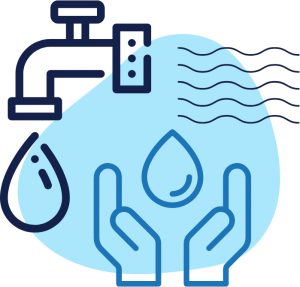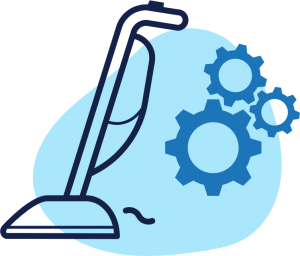SAVE MONEY AND THE PLANET
WITH OUR ENERGY-SAVING TIPS
TOP TIPS FOR ENERGY SAVINGS
In 2024, caring for the environment and saving money on your energy bills is on everybody’s mind. There are some simple changes you can make to reduce your energy consumption. One way is by using energy saving devices like LED bulbs. Making gradual changes to the way you use energy in your home or business can give you greater energy efficiency and lower bills.
LIGHTING
You don’t have to sit in the dark to make energy savings. Lighting accounts for around 10% of energy consumption in most households, so changes you make to lighting your home can have a significant impact on the amount you save.
Did you know that around 90% of the energy used by a halogen bulb is wasted not on lighting, but on heat? That is quite literally a waste of both energy and money, particularly in the summer months when the last thing you need is more heat! LEDs use around 75% less power than halogen and last 5–10 times longer. Most people see a return on installation costs in as little as a year and in some circumstances, government rebates are available to replace your halogens with LEDs.
Switch off lights in unoccupied rooms. If you can’t get everyone in your house to stick to the ‘switch the light off!’ rule, motion sensors can be a great way to ensure lights are only on when you need them.
Maximise the availability of sunlight entering your home where you can and opt for natural lighting throughout the day. Natural lighting has benefits on your mood and sleep patterns, so make the most of it.

Mood lighting, anyone? Try to use lamps instead of overhead lights where light is needed most, like over desks or reading nooks. Sometimes bright overhead lights are just plain unnecessary.
Consider installing time, motion or light-sensor switches so your lights come on only when they are needed. Not only do sensors save power, but they have other benefits too, like convenience and safety — no more stumbling to find the loo in the dark!
COOLING & HEATING
You don’t have to sweat it out in summer or freeze in winter to save energy. With some thoughtful changes to your routine, energy savings are achievable without sacrificing comfort.
Only heat or cool the area you need. Close off doors to unoccupied rooms while cooling or heating is turned on to reduce the amount of energy required to affect the temperature in the room.
Use it, don’t lose it! Avoid placing heaters underneath windows to prevent heat loss.
Switch it off when you don’t need it. Remember to turn off your cooling or heating overnight and when you’re out for energy savings.
To keep your home cozy during winter, close windows and doors and seal off any cracks. Draught stoppers can be a simple solution that make a big difference to both your comfort and energy consumption.

In summer, do the opposite! Let that cool breeze in by opening the windows wide and taking advantage of that fresh air throughout your home.
Insulation keeps homes cool in summer and warm in winter by reducing heat transfer. Wall and ceiling insulation can save up to 20% of energy consumption from heating and cooling.
APPLIANCES
Appliances are easy to ignore as part of an energy-saving strategy. Once they’re in your home, they’re rarely given a second thought, they just become part of your life. But are they being used as efficiently as they could be?
Opt for energy-saving appliances when purchasing new stuff. Energy Rating Labels will give you the best indication of energy efficiency — more stars = lower running costs.
Appliances run most efficiently when at the capacity they are made for — so size them for your needs. A massive empty fridge uses more energy than a small, full fridge. Same goes for dishwashers, washing machines and dryers. Choose appliances appropriate to the needs of your household.
Don’t do a wash on empty. Try to wait until you have a full load before running the washing machine or dishwasher. Fewer cycles means more savings.

How many appliances in your home are sitting on standby? A TV, maybe? Vacuum cleaner? Powered wireless speakers? According to the consumer advocacy group Choice, Australians are losing hundreds of dollars a year on appliances that constantly draw low levels of electricity. Not to mention all the CO2 and greenhouse gasses they emit! When they aren’t needed, turn your appliances off at the wall.
Washing on cold and avoiding the dryer are easy energy savers in our part of the world. We’re pretty lucky to live in one of the sunniest places on the planet. Make the most of it and dry your clothes outside.
WATER
Did you know that saving water saves energy too?
Fix that dripping tap! Every time you run the hot tap, those heated drips that trickle away are all energy untapped (pardon the pun!).
Short showers save! Kramer, from the long-running tv show Seinfeld, described bathing as ‘soaking in your own filth’. Ditch the bath and shorten your shower time.
Install water-saving shower heads (low flow or faucet aerators) — more water saved, less energy used.
Remember to turn off the tap when you brush, wash or shave.

Contrary to what you might think, dishwashers are actually more environmentally-friendly than washing up. Dishwashers use less water and less electricity than heating water for a load of dishes in the sink, particularly if you have a full load.
Don’t heat what you won’t use. If you’re going on holiday, turn off your hot water heater so energy isn’t used unnecessarily.
COOKING
Feeding your family can be more of an energy-saving activity than you thought.
Only cook for as long as you need. Avoid unnecessary simmering of pots while you’re distracted on other tasks, by turning the stove off when food is cooked.
Don’t turn the heat up too high — for stove-top cooking, the electric ring or gas flame should never extend further than the pot or pan you are cooking with.
Wipe down all of your kitchen appliances to remove any build-up of grease or food particles which will cause them to work harder than necessary.

Chuck out the foil at the bottom of your oven! It may be catching all the drips, but, being reflective, foil can reduce the energy efficiency of your oven by changing the heat distribution.
Defrost overnight before cooking. A bit of organisation can save. Defrosting food in the fridge overnight will make a significant difference to the energy required to heat food.
MAINTENANCE
Regular maintenance saves energy.
Clean filters on extractor fans, vacuums and air-con units.
Replace worn seals on windows and doors.
Wipe away dust and cob-webs from all appliances — even those up really high! — to keep them running at optimal efficiency.

Keep your oven clean. That’s right! It’s always a good idea to keep your oven clean and sparkly! A dirty oven heats up more slowly than one that has been properly cleaned, so it will cost you money in the long run.
Pay attention to manufacturer-recommended service schedules. Regular servicing of your appliances will ensure that they are running smoothly and will reduce any unnecessary energy expenditure.
AT WORK
Energy savings at the office, where power requirements are usually greater than the average household, can have a huge impact on the environment and your energy bills.
Switch to low-energy lights, such as LED or Compact Fluorescent lights, especially in areas where lighting is used for extended periods of time. LEDs and CFLs both use around 75% less power than halogen bulbs. According to the NSW Government, switching to energy-saving lighting can save businesses as much as 80% of their lighting costs.
Install timers or movement detectors for lighting in areas used less frequently.
Hot desking is in, permanent desks are out! Covid has changed the way we work forever. Take advantage of the transition to flexible working by using laptops, they are far more energy efficient than desktop computers and a better fit for a flexible workforce.
Screensavers are not energy savers. Quite the opposite! The screen is still on and it takes just as much electricity, if not more, to power a screensaver than it does to power your computer when you’re using it. Some even stop your computer from switching to sleep mode. Save energy by setting office screens to automatically switch off after a set time of inactivity. Screens can be off while networked systems are still on for overnight backups and updates.

Don’t leave shared equipment on stand-by. Photocopiers, printers, scanners and kitchen appliances all use low levels of power while they’re sitting there. Turn them off at night and weekends when they’re not needed.
Reduce waste — print less, use fewer coffee cups, recycle. Be mindful of the impact business activities are having on the environment and create actionable processes for reducing energy use.

CONTACT US TO FIND OUT
HOW WE CAN HELP YOU SAVE ON YOUR ENERGY BILLS


